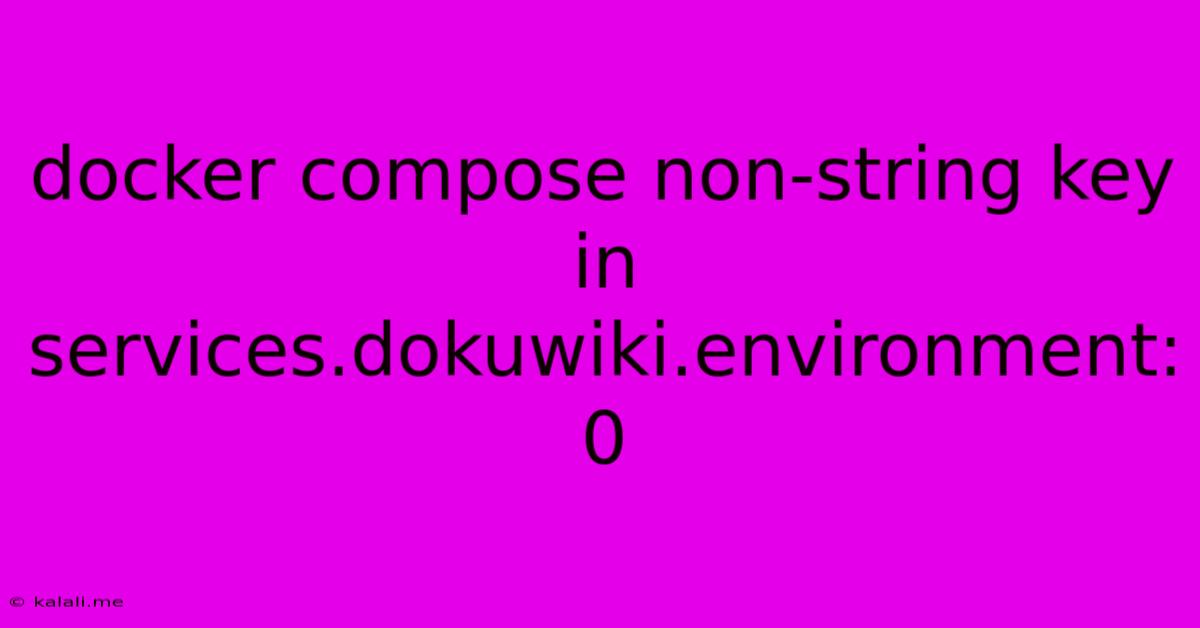Docker Compose Non-string Key In Services.dokuwiki.environment: 0
Kalali
May 24, 2025 · 3 min read

Table of Contents
Docker Compose: Non-String Key in services.dokuwiki.environment: 0
This error, "non-string key in services.dokuwiki.environment: 0," within your Docker Compose file signifies a critical issue: you're attempting to define an environment variable in your DokuWiki service using a numerical key (0) instead of a string. Docker Compose requires all environment variable keys to be strings. This article will delve into understanding the error, its causes, and how to resolve it effectively. We'll also explore best practices for managing environment variables within your Docker Compose configurations.
Understanding the Error
The error message is quite explicit. When defining environment variables under the environment section of your docker-compose.yml file for the DokuWiki service, you've provided a numerical key (in this case, 0) where a string key is expected. Docker Compose parses this configuration and, upon encountering a non-string key, throws this error, preventing your application from starting correctly.
Common Causes and Solutions
The most frequent cause of this error is a simple typo or oversight in your docker-compose.yml file. Let's examine potential scenarios and their respective fixes:
-
Accidental Numerical Key: You might have inadvertently used a number (like
0,1,2, etc.) instead of a descriptive string.Solution: Replace the numerical key with a descriptive string representing the environment variable. For example, instead of:
environment: 0: "value"Use:
environment: MY_VARIABLE: "value" -
Incorrect YAML Syntax: An error in the YAML formatting can lead to the interpreter misinterpreting your input. Ensure your YAML file is correctly formatted, with proper indentation and colon placement. Using a YAML linter can help identify syntax issues.
Solution: Carefully review your
docker-compose.ymlfile for any syntax errors. Pay close attention to indentation. Tools like YAML validators can be invaluable in detecting these errors. -
Data Type Mismatch: In rare cases, there might be a data type mismatch outside of the environment variables directly. Check for any arrays or other data types that are incorrectly placed.
Solution: Review the entire service definition for data type inconsistencies. Ensure all components of your configuration are properly typed according to the Docker Compose specification.
-
Copy-Paste Errors: If you've copied and pasted the configuration from another source, ensure there are no hidden characters or unintended spaces.
Solution: Manually retype the relevant section of your
docker-compose.ymlfile to eliminate potential copy-paste errors.
Best Practices for Environment Variables in Docker Compose
To avoid future issues, follow these best practices:
- Use Descriptive String Keys: Always use descriptive string keys for your environment variables (e.g.,
DATABASE_URL,API_KEY,DOKUWIKI_ADMIN_PASSWORD). This enhances readability and maintainability. - Maintain Consistent Case: Stick to a consistent naming convention (e.g., uppercase with underscores).
- Leverage
.envFiles: For sensitive information, store your environment variables in a separate.envfile and use theenv_fileoption in yourdocker-compose.ymlfile. This helps maintain security and keeps your main configuration file cleaner. - Version Control: Always version control your
docker-compose.ymland.envfiles (if applicable) to track changes and facilitate easy rollbacks.
By adhering to these best practices and carefully examining your YAML configuration, you can effectively resolve the "non-string key in services.dokuwiki.environment: 0" error and ensure your Docker Compose setup functions correctly. Remember to always validate your YAML syntax to prevent similar issues.
Latest Posts
Latest Posts
-
R C Cola And A Moon Pie
Jul 04, 2025
-
If I Was 18 What Year Would I Be Born
Jul 04, 2025
-
One And Three Hundred Twenty Four Thousandths
Jul 04, 2025
-
How Much Is 2 Pounds Of Cream Cheese
Jul 04, 2025
-
How Do You Pronounce M I C H A L
Jul 04, 2025
Related Post
Thank you for visiting our website which covers about Docker Compose Non-string Key In Services.dokuwiki.environment: 0 . We hope the information provided has been useful to you. Feel free to contact us if you have any questions or need further assistance. See you next time and don't miss to bookmark.